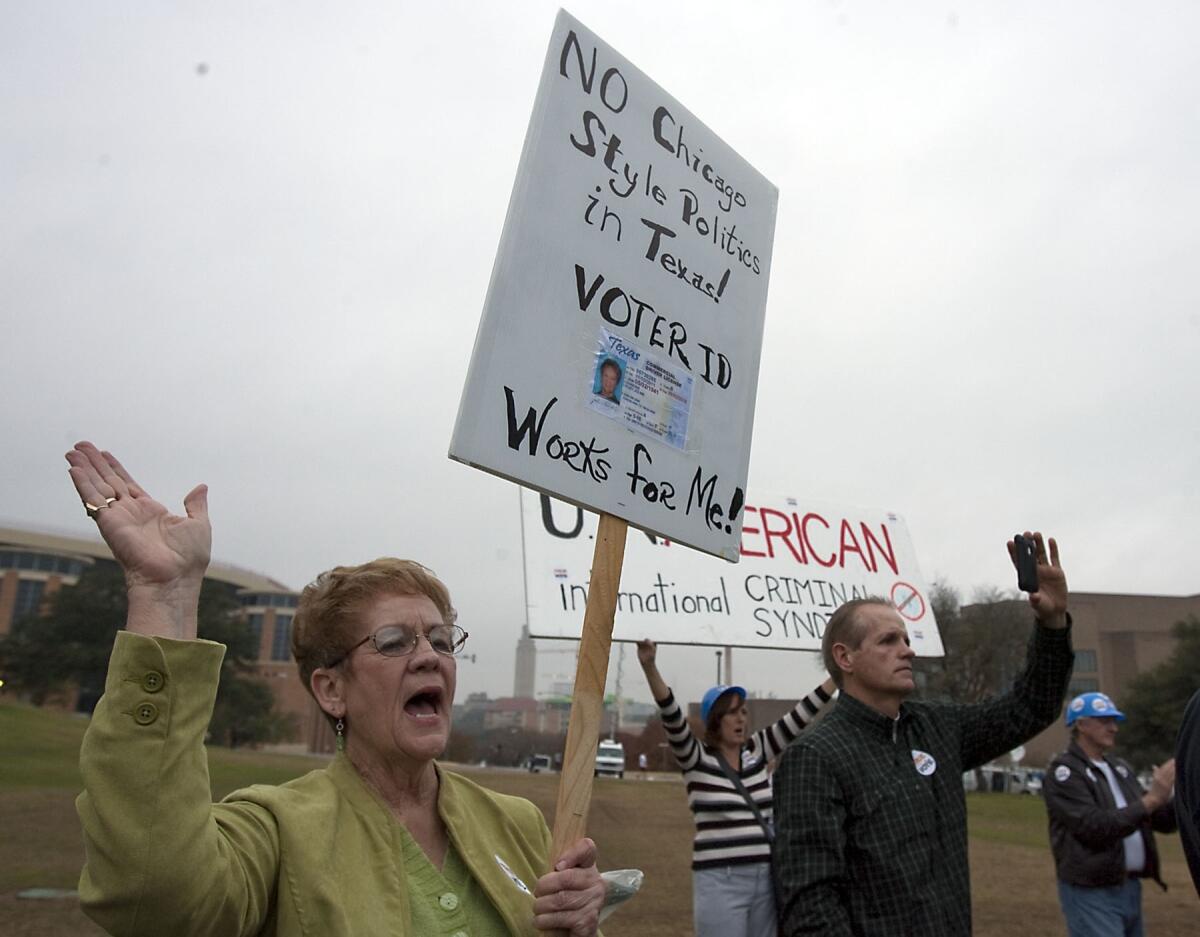A good day for voting rights -- or is it?

- Share via
Restrictive voter ID laws in Texas and Wisconsin have been blocked by federal judges--in the latter case by the Supreme Court--in what may be harbingers of a judicial pushback against efforts by Republicans to disenfranchise minority voters. Meanwhile the Government Accountability Office released a report documenting that voter ID laws in Kansas and Tennessee succeeded in reducing black voter turnout, as they were devised--let’s not beat about the bush--to do.
Is the tide of voter suppression laws turning? Unfortunately, it’s too early to say. But the signs may not be as encouraging as they appear on the surface. As Rick Hasen, the election-law expert at UC Irvine, observed a couple of weeks ago, “the longer-term prospects for court protection of voting rights appear bleak. We cannot expect the Supreme Court to read voting rights protections broadly, and we cannot expect a polarized Congress to pass any new voting rights protections....Instead, the battle over voting rights will have to be fought state by state, through political action and agitation.”
For the moment, however, we have the Texas and Wisconsin decisions. Texas is by far the most thorough. In a 147-page opinion, Federal Judge Nelva Gonzales Ramos vivisected the state’s 2011 voter ID law, finding that it “creates a substantial burden on the fundamental right to vote, has a discriminatory effect and purpose, and constitutes a poll tax.”
Texas Attorney General Greg Abbott, who as the Republican candidate for governor in next month’s election would be a direct beneficiary of the overturned law, announced his intention to appeal Ramos’ ruling to the Fifth Circuit Court of Appeals. Hasen thinks the state has a good chance of prevailing, based on a principle handed down by the Supreme Court in 2006 and known as Purcell, that courts should avoid changing voting rules this close to an election, even if they’re noxious.
Election law experts say that the discrimination Ramos cited was so gross and deliberate that her decision, if it’s upheld, would warrant bringing Texas back under the preclearance rules of the Voting Rights Act of 1965, which were eviscerated by the Supreme Court last year. That means Texas would need the advance approval of the Justice Department to make any voting law changes.
The state’s law sharply cut back forms of ID permissible for voting. Among other things, student IDs were disallowed, although concealed-weapons permits were all right.
Texas has consistently argued that its voter suppression efforts, which include a discriminatory redistricting plan, aren’t aimed at suppressing black votes, but Democratic votes--and that should be OK. Efforts “to increase the Republican Party’s electoral prospects at the expense of the Democrats,” the state argued in defense of the redistricting, are “perfectly constitutional...even if there are incidental effects on minority voters who support Democratic candidates.”
In the Wisconsin case, the Supreme Court voted 6-3 to block the Wisconsin voter law, also on the Purcell principle. The majority overturned an appeals court ruling upholding the law that Hasen charitably described as “heartless and dismissive.” Among other things, the ruling had accepted the state’s argument that only about 10% of Wisconsin voters lacked the requisite photo IDs, so what’s the big deal? That’s 300,000 voters. It should go without saying that any government official who condones keeping 300,000 voters from the polls should be disqualified from public service. But the appeals court dissenters came close to saying it anyway: “To accept the disenfranchisement of 10% of a state’s registered voters...is shocking.”
As for the effect of voter ID laws like the Texas and Wisconsin statutes, they achieve their ulterior purpose. The GAO measured the effect of voter ID laws in Kansas and Tennessee by comparing turnout to other states and adjusting for other factors, such as the presence of high-profile candidates or initiatives on the ballot. The agency found that turnout decreased in Kansas by as much as 2.2% versus the comparison states, and in Tennessee by as much as 3.2 percentage points. Voter suppression was especially notable among voters aged 18-23, those registered less than one year, and among African Americans.
Turning to the usual pretext for voter ID laws, which is that they combat voter fraud, the GAO noted that there’s almost no documented evidence that voter ID fraud is a problem. Ramos found the same thing. The real threat to fair elections isn’t voter impersonation, which these laws purport to fight; it’s politicians impersonating public servants. The rule of thumb about these laws should be crystal clear: A politician who tries to win an election by keeping voters away from the polls has nothing to offer any voters at all.
Keep up to date with the Economy Hub. Follow @hiltzikm on Twitter, see our Facebook page, or email mhiltzik@latimes.com.
More to Read
Inside the business of entertainment
The Wide Shot brings you news, analysis and insights on everything from streaming wars to production — and what it all means for the future.
You may occasionally receive promotional content from the Los Angeles Times.











